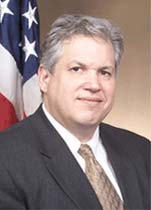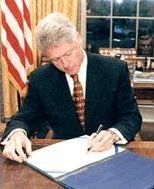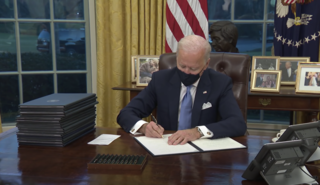This is a list of notable events in the history of LGBT rights that took place in the year 1992.
This is a list of notable events in the history of LGBT rights that took place in the year 1995.
The Employment Non-Discrimination Act (ENDA) is legislation proposed in the United States Congress that would prohibit discrimination in hiring and employment on the basis of sexual orientation or, depending on the version of the bill, gender identity, by employers with at least 15 employees.

The U.S. Equal Employment Opportunity Commission (EEOC) is a federal agency that was established via the Civil Rights Act of 1964 to administer and enforce civil rights laws against workplace discrimination. The EEOC investigates discrimination complaints based on an individual's race, color, national origin, religion, sex, age, disability, genetic information, and retaliation for participating in a discrimination complaint proceeding and/or opposing a discriminatory practice.

Executive Order 11246 was an executive order of the Article II branch of the U.S. Federal government, in place from 1965 to 2025, specifying non-discriminatory practices and affirmative action in federal government hiring and employment.

The United States Office of Special Counsel (OSC) is a permanent independent federal investigative and prosecutorial agency whose basic legislative authority comes from four federal statutes: the Civil Service Reform Act, the Whistleblower Protection Act, the Hatch Act, and the Uniformed Services Employment and Reemployment Rights Act (USERRA). OSC's primary mission is the safeguarding of the merit system in federal employment by protecting employees and applicants from prohibited personnel practices (PPPs), especially reprisal for "whistleblowing." The agency also operates a secure channel for federal whistleblower disclosures of violations of law, rule, or regulation; gross mismanagement; gross waste of funds; abuse of authority; and substantial and specific danger to public health and safety. In addition, OSC issues advice on the Hatch Act and enforces its restrictions on partisan political activity by government employees. Finally, OSC protects the civilian employment and reemployment rights of military service members under USERRA. OSC has around 140 staff, and the Special Counsel is an ex officio member of Council of Inspectors General on Integrity and Efficiency (CIGIE), an association of inspectors general charged with the regulation of good governance within the federal government.

Lesbian, gay, bisexual, transgender, and queer (LGBTQ) people in the United States may face legal challenges not experienced by non-LGBTQ residents, with civil protections widely varying by state. The rights of lesbian, gay, bisexual, transgender, and queer (LGBTQ) people in the United States were among the most advanced in the world until the beginning of the second Trump presidency, with public opinion and jurisprudence changing significantly since the late 1980s.

Equal employment opportunity is equal opportunity to attain or maintain employment in a company, organization, or other institution. Examples of legislation to foster it or to protect it from eroding include the U.S. Equal Employment Opportunity Commission, which was established by Title VII of the Civil Rights Act of 1964 to assist in the protection of United States employees from discrimination. The law was the first federal law designed to protect most US employees from employment discrimination based on that employee's race, color, religion, sex, or national origin.
Employment discrimination law in the United States derives from the common law, and is codified in numerous state, federal, and local laws. These laws prohibit discrimination based on certain characteristics or "protected categories". The United States Constitution also prohibits discrimination by federal and state governments against their public employees. Discrimination in the private sector is not directly constrained by the Constitution, but has become subject to a growing body of federal and state law, including the Title VII of the Civil Rights Act of 1964. Federal law prohibits discrimination in a number of areas, including recruiting, hiring, job evaluations, promotion policies, training, compensation and disciplinary action. State laws often extend protection to additional categories or employers.
Executive Order 11478, signed by U.S. President Richard M. Nixon on August 8, 1969, prohibited discrimination in the competitive service of the federal civilian workforce on certain grounds. The order was later amended to cover additional protected classes.

Scott Bloch is an American attorney and former political appointee of President George W. Bush. Bloch served as United States Special Counsel from December 12, 2003, when Bush signed his appointment, filling out his five-year statutory term on December 11, 2008.
A protected group, protected class (US), or prohibited ground (Canada) is a category by which people are qualified for special protection by a law, policy, or similar authority. In Canada and the United States, the term is frequently used in connection with employees and employment and housing. Where illegal discrimination on the basis of protected group status is concerned, a single act of discrimination may be based on more than one protected class. For example, discrimination based on antisemitism may relate to religion, ethnicity, national origin, or any combination of the three; discrimination against a pregnant woman might be based on sex, marital status, or both.
President Dwight D. Eisenhower issued Executive Order 10450 on April 27, 1953. Effective May 27, 1953, it revoked President Truman's Executive Order 9835 of 1947, and dismantled its Loyalty Review Board program. Instead, it charged the heads of federal agencies and the Civil Service Commission, supported by the Federal Bureau of Investigation (FBI), with the task of investigating federal employees to determine whether they posed security risks. It expanded the definitions and conditions used to make such determinations. The order contributed to the ongoing Lavender scare of the mid-1950s, barring thousands of lesbian and gay applicants from government jobs.

Executive Order 12968 was signed by U.S. President Bill Clinton on August 2, 1995. It established uniform policies for allowing employees of the federal government access to classified information. It detailed standards for disclosure, eligibility requirements and levels of access, and administrative procedures for granting or denying access and for appealing such determinations. It expanded on the President Dwight D. Eisenhower's Executive Order 10450 of 1953.

LGBT employment discrimination in the United States is illegal under Title VII of the Civil Rights Act of 1964; employment discrimination on the basis of sexual orientation or gender identity is encompassed by the law's prohibition of employment discrimination on the basis of sex. Prior to the landmark cases Bostock v. Clayton County and R.G. & G.R. Harris Funeral Homes Inc. v. Equal Employment Opportunity Commission (2020), employment protections for LGBT people were patchwork; several states and localities explicitly prohibit harassment and bias in employment decisions on the basis of sexual orientation and/or gender identity, although some only cover public employees. Prior to the Bostock decision, the Equal Employment Opportunity Commission (EEOC) interpreted Title VII to cover LGBT employees; the EEOC determined that transgender employees were protected under Title VII in 2012, and extended the protection to encompass sexual orientation in 2015.
Executive Order 13672, signed by U.S. President Barack Obama on July 21, 2014, amended two earlier executive orders to extend protection against discrimination in hiring and employment to additional classes. It prohibited discrimination in the civilian federal workforce on the basis of gender identity and in hiring by federal contractors on the basis of both sexual orientation and gender identity.
Bostock v. Clayton County, 590 U.S. 644 (2020), is a landmark United States Supreme Court civil rights decision in which the Court held that Title VII of the Civil Rights Act of 1964 protects employees against discrimination because of sexuality or gender identity.

Executive Order 13988, officially titled Preventing and Combating Discrimination on the Basis of Gender Identity or Sexual Orientation, was the fourth executive order signed by U.S. President Joe Biden on January 20, 2021. It was rescinded by Donald Trump within hours of his assuming office on January 20, 2025.









